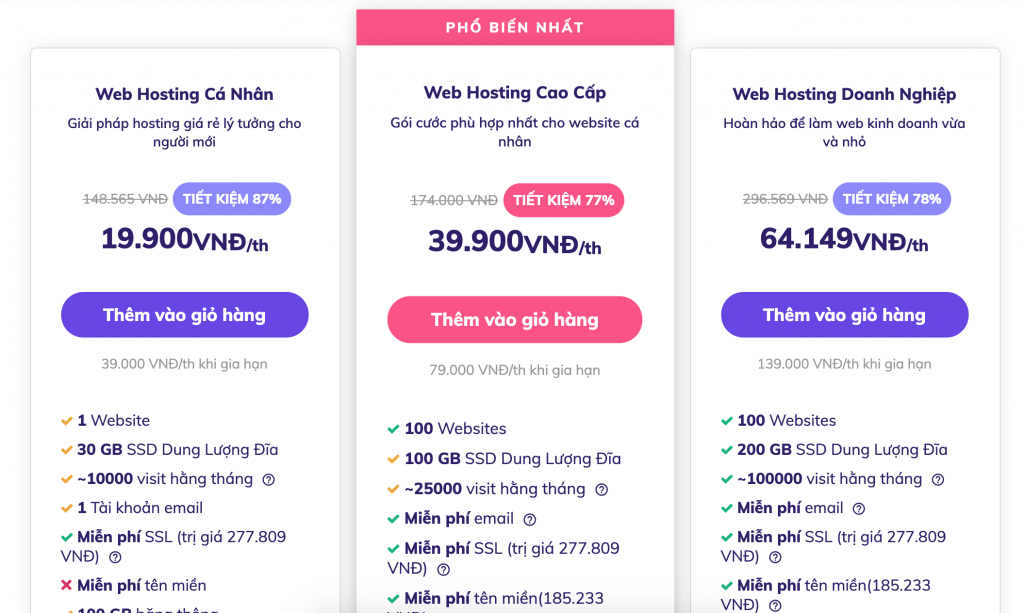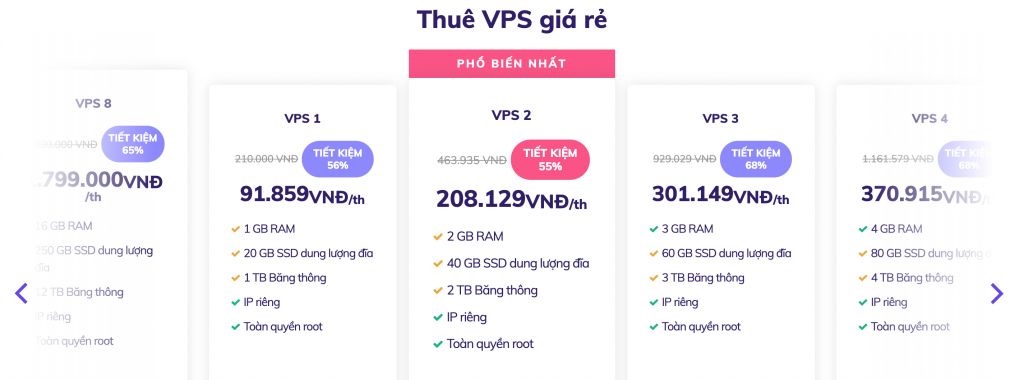You are starting a website and need to find a hosting provider that can provide you with hosting. There are many types of hosting, created to support different types of websites. You are not sure how to choose? No need to worry, we will talk about the two most popular types of web hosting that will suit your needs – Shared hosting and VPS hosting.
We'll cover the basics of each, what features they offer, and the pros and cons of each. Let's get started.
Shared hosting is like you living in an apartment where you have to share places like swimming pool, backyard or parking lot. In this case, your site will share the same resource, such as CPU , disk space and Memory with other users on the same shared hosting server.
Shared hosting is the cheapest option among all host types. Unfortunately, your website may have limited bandwidth and will slow down as a lot of traffic concentrates on websites on the same server as you.
You can enjoy the pool when it's not crowded, but you still have to count before more people get in and things get crowded – that's what shared hosting is.
Why choose Shared Hosting?
- Are you building a blog or personal page?
- Want to create a small to medium sized corporate website
- Have a small budget
- Don't know much about web development
Advantages
- A more beginner-friendly hosting solution
- Provide standard setting available
- Requires less technical expertise
- The least expensive of all hosting options
Defect
- Usually has less bandwidth and capacity than VPS
- Error prone when there is high traffic
- You have limited access to the user interface
- It doesn't give you root access
What is VPS hosting?
With VPS hosting, you will still share a physical server, but each user gets a specific resource plan, which means other sites on the same server won't affect you, unlike with shared hosting. VPS hosting service provides a dedicated virtual partition for each user, ensuring resources are always available to you. Of course, VPS costs more than Shared hosting.
Going back to living in an apartment, VPS zoning is like owning a penthouse or an apartment – there are many like it in the building, but you have everything you need and no must share it with anyone else.
Why should you choose VPS Hosting?
- You run a business and plan to expand it in the future
- Have a bigger budget and want to invest in your website
- Need to accommodate high traffic for your website in the near future
Advantages
- VPS hosting gives you root access to your server
- Capable of installing almost any application on the operating system
- More memory and bandwidth, easily expandable
- It is not affected by other website traffic
- Much more stable and faster than shared hosting
Defect
- Comes with a slightly higher price tag
- Technical expertise is required for good management
We'll give you some comparisons between the two types of hosting to help you better decide which is best for you.
Security and Performance
Security is essential no matter what type of website you own. Both types of hosting are relatively safe and stable methods to host your website, but there are some differences.
With Shared hosting service, if you have many websites, a faulty website can affect other websites. Also, if other sites take up too much of the shared bandwidth, your site may slow down. This is especially important if your website is experiencing high traffic.
You can avoid this problem by using a VPS, as the partitioned servers ensure each site works accordingly. However, if you don't have much technical knowledge about how to take care of your VPS server, you should consider your options. When managed poorly, it can lead to a host of other problems, and makes VPS even more vulnerable to attacks than shared hosting.
Control
If you are looking for more advanced options for your website, VPS hosting is more suitable than Shared hosting. It grants you root access to the server, so you can install your own operating system and software to optimize the performance and security of your website.
In contrast, using a Shared hosting plan limits you to just standardized server setups. This can be more convenient for people who don't want to interfere with server management tasks themselves.
Server Administration
If you choose to host your website with Shared hosting, you will require no technical or very little maintenance. Shared hosting service providers will set up shared servers, install and upgrade necessary software such as cPanel or hPanel, and monitor the servers to avoid downtime and effectively take care of back end.
On the other hand, VPS hosting is a bit more complicated when it comes to resource management. It needs a bit more advanced knowledge to run and manage. Fortunately, VPS hosting allows you to customize and configure applications and software to boost your website's performance, provide root access, and allow you to tailor the user interface to your needs. mine.
Ability of extension
VPS hosting is much easier to scale than Shared hosting. While shared hosting is a good option for a short-term plan or a small site, you'll have more trouble with overall performance if your site hits high traffic numbers.
VPS hosting allows you to scale quickly and easily, and if you can predict the growth of your website, a VPS service can be a great investment for your future.
Hosting rates
Shared hosting wins in this section. However, VPS price will be because of its greater advantage. This is the Hostinger Shared Hosting price list.

For comparison, here is the Hostinger VPS price list:

While VPS costs a bit more than shared hosting plans, they offer more storage space and more bandwidth.
When to upgrade hosting?
If you are using Shared hosting and like it, you may be wondering when is the best time to upgrade to a VPS hosting plan. Here are some questions you can ask yourself:
- Do I want more options and freedom to manage my server?
- Will I get a significant increase in traffic in the future?
- Would I consider hosting more than one website someday?
Regardless of your choice, there are great benefits to both Shared hosting and VPS hosting options. You just need to weigh in your options.
What other types of web hosting are there?
Besides Shared hosting and VPS hosting, there are several other popular options – a combination of dedicated and cloud hosting services.
Dedicated hosting or private hosting is a service that stores an application or website entirely on a single physical server, solely for your personal use. You don't have to share it with anyone else and feel free to customize it to your liking. However, this is the most expensive option of them all.
Cloud hosting is a type of web hosting that uses multiple servers to balance traffic and increase uptime. It is inspired by the cloud computing technology that allows a large number of machines to act as a system.
Instead of hosting your website on one server, it is hosted on multiple locations. For example, if one server fails, another helps keep things running without downtime.
Epilogue
Your plan to choose your type of hosting is largely based on what you expect from your website. VPS hosting offers you advantages that shared hosting cannot provide. However, there are key benefits that both provide.
To choose a web hosting plan for your website, consider what kind of features you're most interested in. Here is a short summary:
- Security and Performance. With Shared hosting, you are essentially sharing space with other users on the server. VPS is much more stable and secure but requires more technical knowledge.
- Server Administration. Shared hosting is much more suitable for beginners than VPS, but lacks the freedom to customize compared to the latter option.
- Ability of extension. VPS is more future proof than Shared hosting.
- Price. Both plans are priced differently with different benefits, but the shared hosting plan is less expensive than owning a virtual private server.
Ultimately, the choice depends on whether you're just starting out with the web, or need any special features. If you only use hosting to create a simple website, you can close your eyes and choose shared hosting right away. When developing to a certain point, consider upgrading to a VPS. Regardless of your choice, we hope that this guide has been helpful to you.





إرسال تعليق
إرسال تعليق